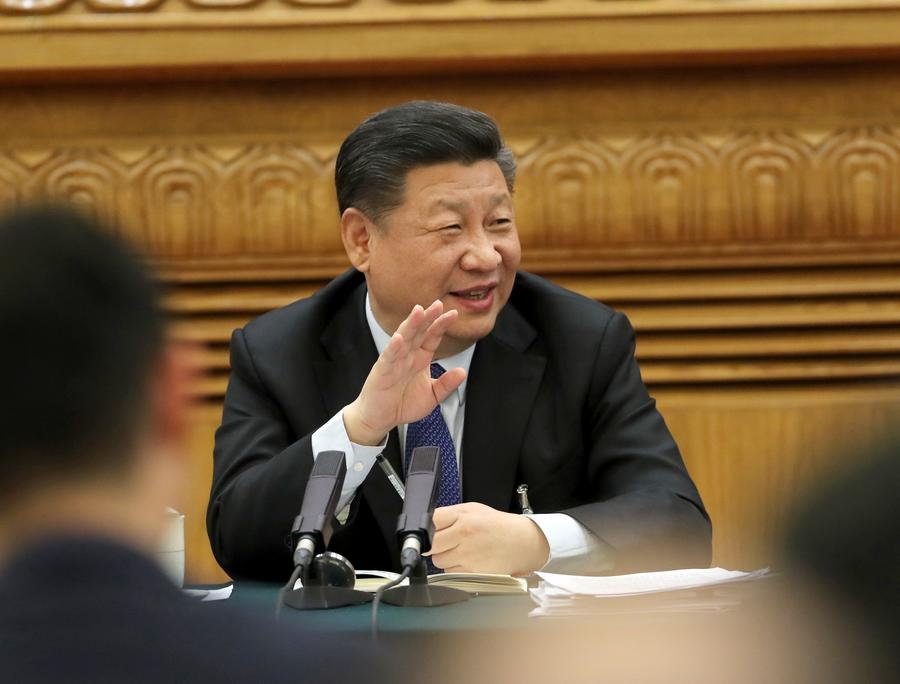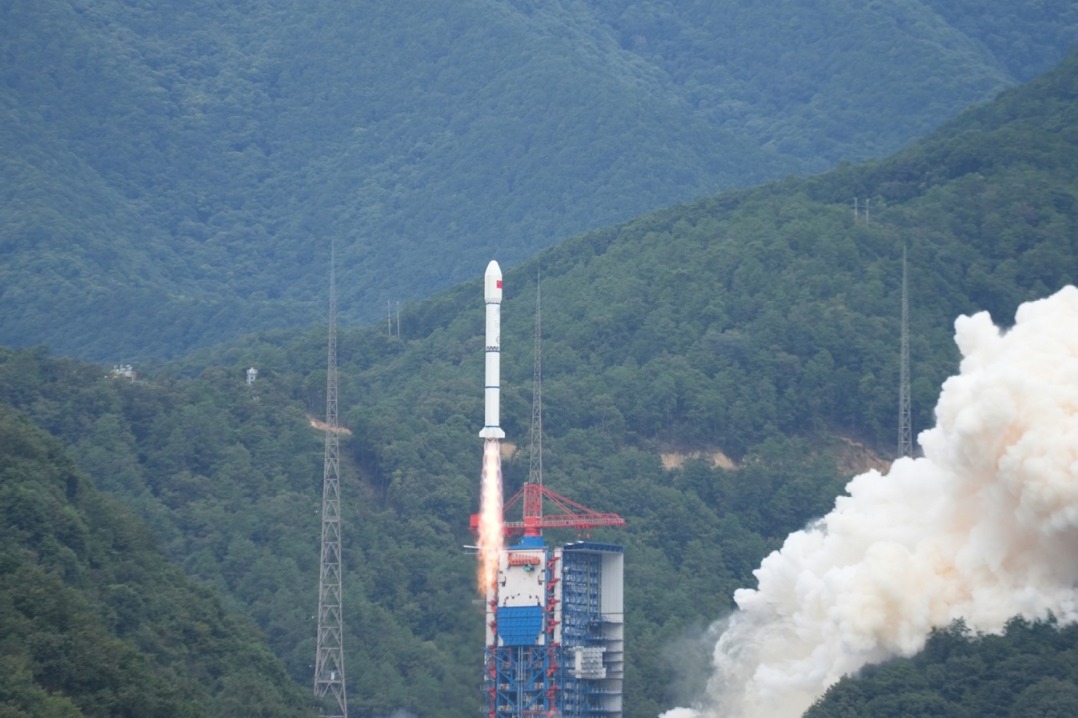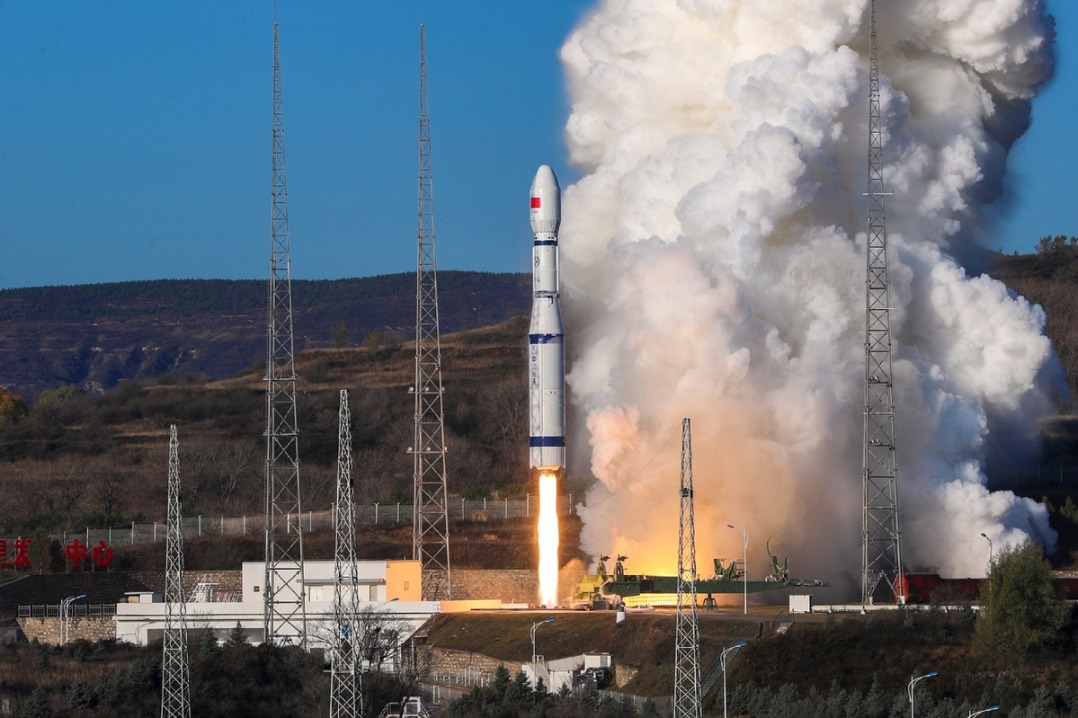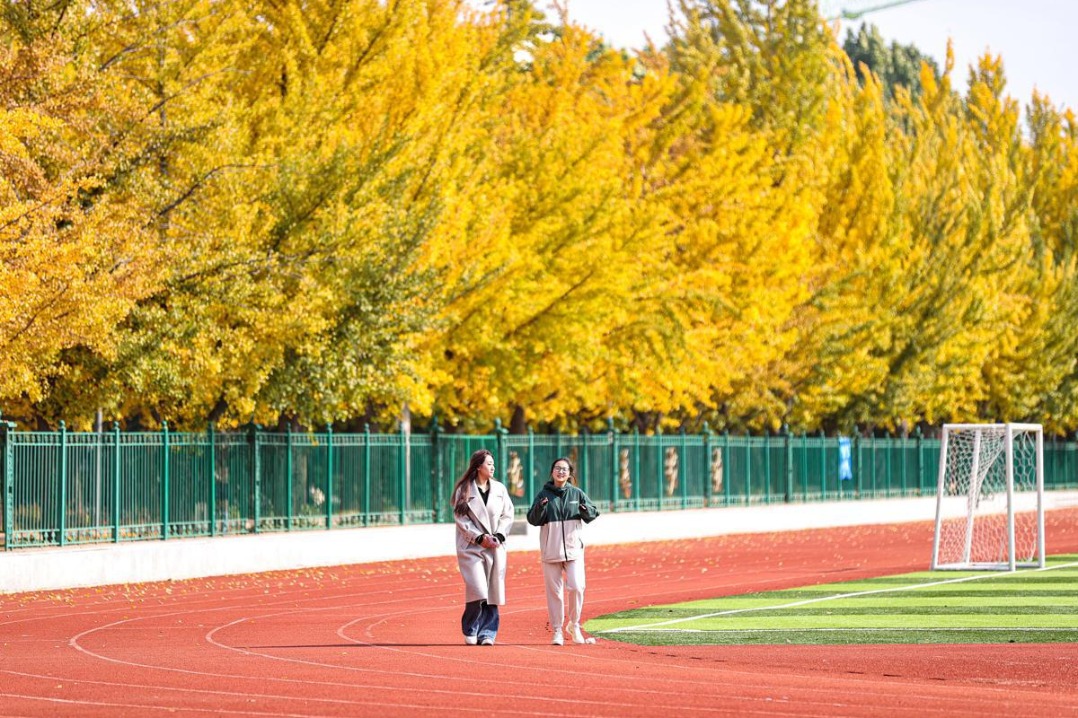Xi stands on the front line of reform


President inspires Party members, lawmakers to strive for improved economic, social systems, An Baijie reports.
In a discussion with lawmakers from Guangdong province on March 7, President Xi Jinping talked of a visit he made five years ago to Shenzhen, the pioneer of China's reform and opening-up.
That visit sent a signal to the world that the Communist Party of China Central Committee will firmly uphold the courageous policy launched four decades ago, Xi told deputies to the National People's Congress in a panel discussion during the ongoing session of the legislature.
About three weeks after taking office as general secretary of the CPC Central Committee in late 2012, Xi took the same route as Deng Xiaoping in 1992, heading to Guangdong, where he declared, "Reform and opening-up decide China's fate."
In a speech in which he called Guangdong a front-line experimental zone for reform and opening-up, the president said improving the structure of China's economy was crucial to upgrading the engines driving growth.
This year marks 40 years of reform and opening-up. The process was put in motion in 1978 at the Third Plenary Session of the 11th CPC Central Committee.
The policy has brought huge economic and social development to the country over the past four decades: China is now the world's second-largest economy; per capita GDP has rocketed from about $100 to more than $8,000; and more than 700 million citizens have been lifted out of dire poverty.
During this year's session of the top legislature, many NPC deputies voiced their support for deepening overall reform. Lu Yi, a deputy who is Party secretary in Foshan, Guangdong, said he has been encouraged by Xi's remarks emphasizing the real economy and upgrading the economic structure.
"We will follow Xi's instructions and with great courage eliminate highly polluting industries and companies, continue to streamline industrial structures and build a high-quality, high-level and open economy," he said.
Reform and opening-up are the most powerful engines for economic and social development, he added.
He Haitao, an NPC deputy who is Party secretary of Shenzhen's Luohu district, said his district will also follow Xi's instructions to deepen reform and take an active role in building the Guangdong-Hong Kong-Macao Greater Bay Area.
"Luohu was a pioneer of reform and opening-up, and we will take the lead in implementing Xi's requirement to set the pace for deepening overall reform," he said, adding that the district will focus on scientific innovation and smart manufacturing, among other sectors.
Zeng Qing, an NPC deputy and mayor of Guang'an, Sichuan province, said the reform measures of the past five years have brought real benefits to the people. Guang'an has eliminated hundreds of approval procedures since 2013, and that has led to rapid increases in corporate investment, he said.
Zhang Xuewu, an NPC deputy and entrepreneur from Hunan province, said he was excited by the tax reduction plan mentioned in the Government Work Report delivered by Premier Li Keqiang on March 5.
"Tax reductions will remove the burden on entrepreneurs, and we'll have more capital for research and development," he said.
Deepening overall reform was one of the most important tasks set out in October at the Party's 19th National Congress, which elected a new CPC Central Committee and drew up a blueprint for national development.
In his report to the congress, Xi used the word "reform" 71 times, indicating his determination to introduce a raft of amendments and new measures.
"We must have the determination to get rid of all outdated thinking and ideas and all institutional ailments, and to break through the blockades of vested interests," he said.
The Leading Group for Deepening Overall Reform of the 19th CPC Central Committee, which is led by Xi, has held two meetings since October to review documents and set tasks in various areas, including pensions, poverty reduction, rural environment, education and intellectual property.
On many occasions, Xi has highlighted the importance of deepening reform as part of the Party's efforts to lead the Chinese people in building a moderately prosperous society in all aspects.
In his New Year speech, the president pledged to resolutely carry out the task because "reform and opening-up is the path we must take to make progress in contemporary China and realize the Chinese Dream".
He added: "Reforms in all areas should be further advanced to constantly improve the level of modernization in China's systems and our capacity for governance."
In an address to the BRICS summit in Xiamen, Fujian province, in September, Xi said China would commemorate the 40th anniversary of reform and opening-up in a grand manner.
Since the Party's 18th National Congress in 2012, Xi has introduced the world's largest set of reforms. The Leading Group for Deepening Overall Reform of the 18th CPC Central Committee held 38 meetings between 2013 and October last year.
Xi made his top-level design and strategic arrangements through the "five-sphere integrated plan"-to promote coordinated economic, political, cultural, social and ecological advancement-and the "four-pronged comprehensive strategy"-to make comprehensive moves to finish building a moderately prosperous society in all aspects, deepen reform, advance law-based governance and strengthen Party governance.
More than 1,500 reform measures have been launched since the CPC's 18th National Congress, and a general framework for reform in major fields has been established.
Last year, 79 major reform tasks were completed, while 399 reform plans were formulated by central authorities.
A series of reform projects were undertaken, touching on the most difficult and tangled areas, from State-owned enterprises, household registration and fiscal management to rural land and public hospitals.
Under Xi's leadership, a new type of modern economic system is taking shape in China, featuring large-scale supply-side structural reform, innovation, rural revitalization, coordinated regional development, socialist market economy and a new pattern of overall opening-up.
Ma Huateng, also known as Pony Ma, chairman and CEO of technology giant Tencent, said the central government has put forward a large number of reform measures in the past five years to support innovative companies.
"We can see that the past five years has been the most innovative period for enterprises in Shenzhen," he said during a panel discussion on March 7 during the NPC session.
Zhu Mingyue, founder and CEO of Chongqing Zhubajie Network, which provides creative services, said the reform measures mean that entrepreneurs like him receive better and faster services from administrative departments.
He said his business ran into difficulty during its first eight years, but it has been growing exponentially for the past four years because of government support for innovative companies.
"The new era is a golden era for entrepreneurs-and I'm sincerely grateful," Zhu said.
- Xi highlights BRICS' role in driving multipolarity, globalization ahead of Kazan Summit
- Mainland official meets with Taiwan cultural circle personages in Beijing
- Senior Chinese military official urges for new military training system
- China launches new remote-sensing satellite group
- 'AI police' improve rate of solving crime
- High tides flood homes, vehicles in coastal cities





































